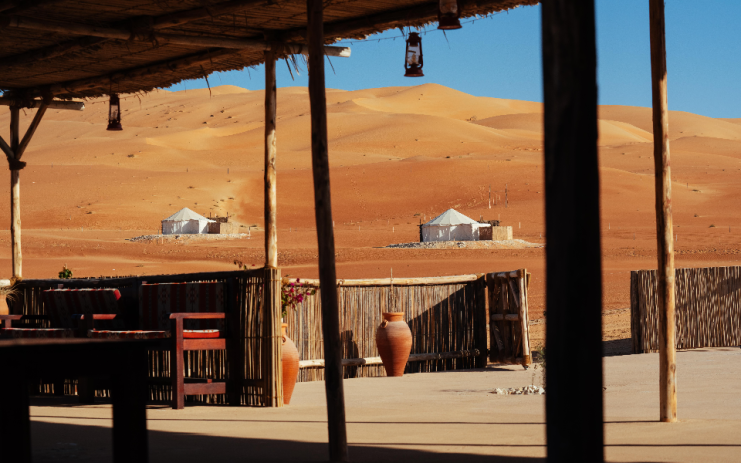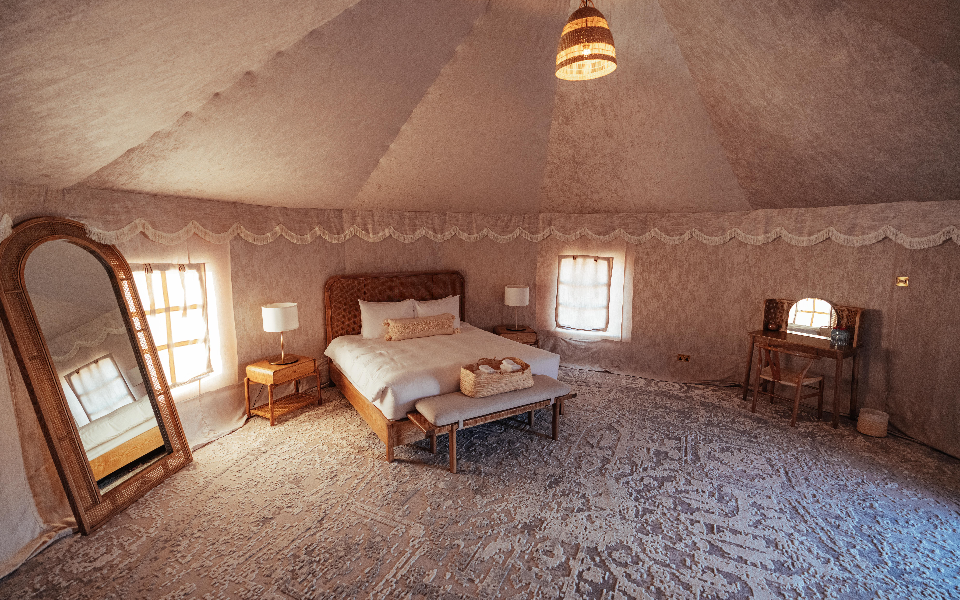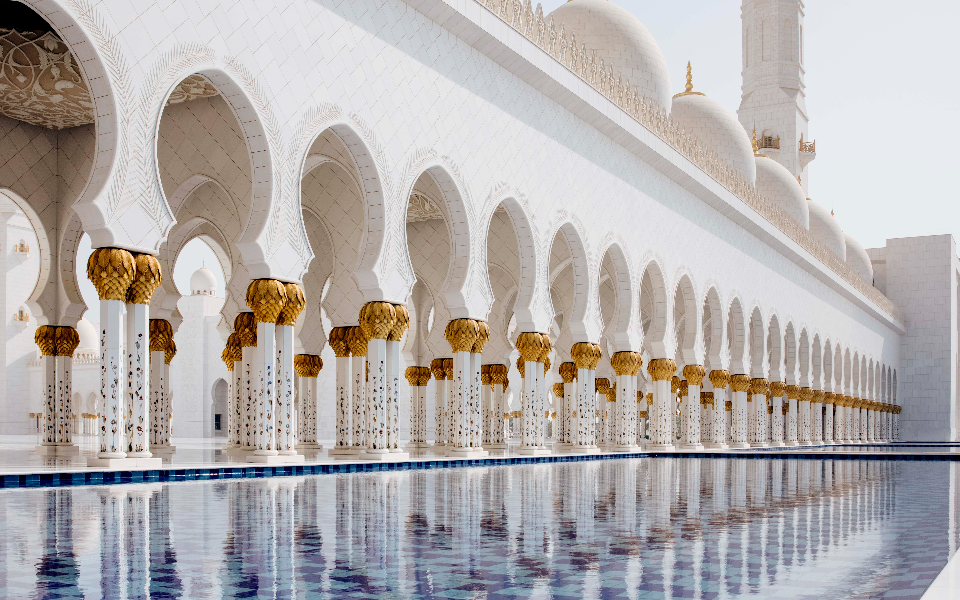I went to the Abu Dhabi grand prix but ‘found myself’ doing desert camping

Sports writer Matt Hardy was in Abu Dhabi to watch the grand prix – but deep in the desert, he had a more profound experience
It was when I was standing barefoot atop a sand dune staring at the blood orange sun setting over a seemingly uninterrupted landscape of desert that I had my first moment of reflection in nearly three years.
The vastness of the Arabian Peninsula’s Empty Quarter was breathtaking. Remnants of ancient ocean beds dotted with fossils cover flat planes of desert surrounded by dunes.
We were a kilometre from the closest permanent settlement, the Liwa Nights Glamping camp, where our bed for the night would be, and, beyond that, it was miles to the next group of locals. Devoid of the hustle and bustle of cities, or the drone of daily bad news, I fulfilled every traveller’s cringy ideal and almost ‘found myself’ in the desert.

The baron all around was a tranquil setting away from the hustle and bustle of London’s Square Mile.
And did I think I’d experience that in the United Arab Emirates? Of course not. But that’s the beauty of encountering something new, isn’t it?
The UAE is made up of seven Emirates. Abu Dhabi is the largest of them and encompasses much of the desert territories of the nation.
Read more: This City of London hotel has a secret rooftop bar with amazing views
A three-hour drive from the high rises and almost garish exhibition of wealth is the glamping retreat of Liwa Nights; 10 tents, each separated by 30 metres of lukewarm sand. They contain a double bed topped with a thick but cool mattress, an en-suite bathroom, and a number of amenities – such as air conditioning – which makes outdoor desert living somewhat bearable.
It’s ironic that in the middle of the Empty Quarter – the largest uninhabited area of desert in the world – even Ivanka Trump, in 2021, found herself some quiet time, though locals suggested her entourage disturbed the peaceful ambiance.
Off the only road for miles, Liwa Nights was a slice of paradise in an otherwise desolate place. We were introduced to the staff with arabic coffee, dates and figs before experiencing the Emirati tradition of falconry – this may be one to sit out if giant birds ripping through the innards of pigeons isn’t really for you.
Afterwards we were taken up the dunes in a buggy, holding on for dear life as the driver almost defied physics in getting us to the summit of the sandy landmass, before we were left atop the beachy mountain adjacent to Moreeb Dune – the largest in the area.
The Emirate of Abu Dhabi has seen seismic change over the past 50 years, after a facelift Beverly Hills would be proud of
The sun set in seconds but it was beautiful, and surrounded by the cleanest of air and brilliant company, it was there where I reflected on what has been a tough number of years for us all.
Going barefoot is recommended; we were told it’s the way the dunes should be experienced, and I agreed until I found out we’d need to walk down and back to camp which involved trekking through a habitat sometimes home to scorpions, as well as tip-toeing over a rough salt bed. Luckily the curly creatures kept away from my vulnerable soles.
Read more: The natural side of Qatar, where the inland sea meets the sand dunes
It’s an understatement of the highest variety to say that the Emirate of Abu Dhabi has seen seismic change over the past 50 years. After a facelift Beverly Hills would be proud of, dramatically rising as a Middle Eastern destination hub.
The entire country has embraced a number of western ideals, with some of the Emirates dramatically liberalising alcohol laws this year to attract British and Western tourists. But across the five days of my visit it was just the singular alcoholic drink, a large limoncello, that found its way into my hand. It was a stark reminder of how much I consume back in London without even contemplating it – maybe my New Year’s Resolution should reflect this newfound discovery?
The hustle and bustle of Abu Dhabi offers lots to explore: there are the countless glass-fronted buildings and malls but also memorials to the founder of the country Sheikh Zayed bin Sultan Al Nahyan, converted oil drill sculptures and the breathtakingly beautiful Sheikh Zayed Grand Mosque. The white marble structure has become an iconic part of the Abu Dhabi skyline, its gleaming walls, pillars, arches and domes an incredibly ambitious homage to ancient Islamic architecture.

It’s barely 15 years old but the building is full of grandeur and historical importance. The special tour given to our party takes us to part of the design not open to the public and the level of detail is astounding. Every flower design within the pillars contains a special stone – usually Lapis Lazuli or Mother of Pear sourced globally – of the highest quality while the main chandeliers weigh a number of tonnes per piece. Some would have a point if they described it as far too much for the eye. It was certainly lavish, if not fussy.
Religious buildings like the Grand Mosque are the centre of communities in Abu Dhabi – as they have been in every one of the world’s major cities going back thousands of years. There’s little police presence on my trip; locals cite the country as one that feels safe due to the severity of punishments dished out by the authorities. We witnessed an Abu Dhabi resident being slapped with a £400 fine for walking across the road away from a crossing.
But experiencing authoritarian ways of life is part and parcel of going, isn’t it? The debate surrounding treatment of people, crimes, and laws in the country is one you can have in every nation. The United Arab Emirates uses Sharia Law, in part, to govern, meaning there remains a threat of criminalisation for being openly LGBTQ+ in public, for example.
The UAE constitution denotes equal rights for men and women but Islamic law does not protect women against needing the approval of a guardian to do certain things. That said, crime is very low in the country and many expats have claimed to feel safer than in the UK.
The Human Dignity Trust states that the death penalty is still possible in the nation, though the same organisation states that latest data shows no arrests for same-sex relationships and that the death penalty has not yet been used in the country for consensual same-sex relationships. Some foreign nationals have however been deported for “clothing deemed inappropriate for one’s sex”.
Overall, though, the Emirate felt safe and friendly – which is more than can be said about a number of European cities just a short hop away – despite a slight internal unease of making sure I did and said the right thing at all times.
Our trip concluded with Formula 1 in the idyllic Yas Marina, the race track flanked by grandstands and mega yachts. It was fun, but the desert part of my trip felt like the reset my 20s needed, and others at varying ages experiencing the nation with me said similar.
Sure, the UAE can be a poolside holiday with Bloody Marys and enough photo ops to keep an Instagram influencer fed and watered for a lifetime, but it also opened my eyes to what’s beyond the oil and wealth that slaps you in the face the moment you arrive.
Abu Dhabi’s desert is a cultural gem, and one I look forward to exploring further in the future.